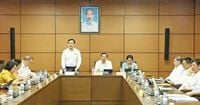On May 10, 2025, the National Assembly of Vietnam convened to discuss a series of proposed amendments to various laws, including the Enterprise Law, the Planning Law, and the Law on Economical and Efficient Use of Energy. The focus of the discussions was primarily on streamlining administrative procedures for businesses, with several delegates voicing their opinions on the proposed changes.
During the session, representative Trần Anh Tuấn highlighted the draft Law's progressive approach to management, which shifts from a "pre-inspection" model to a "post-inspection" model. This change is expected to decentralize authority to member councils and improve the efficiency of business operations. He noted that this shift reflects a more modern understanding of enterprise management that could facilitate growth and innovation.
Among the significant changes proposed in the draft Law is the introduction of new clauses regarding the concept of "false declaration of charter capital." Currently, the law allows enterprises 90 days from their registration date to declare their full charter capital. However, many businesses do not comply with this requirement. The draft Law seeks to amend this by adding specific regulations that define and penalize the act of falsely declaring charter capital, thereby enabling state management agencies to conduct effective post-inspections to identify and address such violations.
Trần Hoàng Ngân, another delegate, applauded the draft Law for removing the requirement that organizations and individuals must use digital signatures or business registration accounts for online business registration. Instead, individuals will now be able to use their personal identification numbers for this process. This change is seen as a move towards simplifying the registration process and reducing bureaucratic hurdles for new businesses.
In addition, the draft Law eliminates the need for individuals registering a business to submit a criminal record to the business registration agency. Ngân expressed that these amendments would significantly lessen the administrative burden on entrepreneurs and citizens, although she emphasized the necessity for coordination between business registration agencies and management bodies to ensure a healthy business environment.
Discussing state policies on energy efficiency, delegate Nguyễn Minh Hoàng expressed general support for the proposed amendments to the Law on Economical and Efficient Use of Energy. He suggested that the draft should clarify the state policies related to energy efficiency, ensuring that they are well-defined within the law's articles. Hoàng stressed the importance of linking these policies with regulations that encourage and support energy-saving measures.
Hoàng also proposed a review of specific clauses in the draft Law to ensure alignment with state policies on energy efficiency. He suggested that the government should consider consolidating scattered policies to create a more coherent framework that promotes energy-saving practices.
In a related discussion, delegate Lê Thị Ngọc Linh from Bạc Liêu raised concerns about the broad scope of the draft Law. She recommended that amendments should focus on addressing specific practical difficulties encountered during implementation, rather than making excessive changes that could disrupt existing laws. Linh emphasized that unnecessary modifications could lead to complications in the legal landscape and suggested maintaining provisions that do not pose issues.
Furthermore, Linh commented on the removal of regulations requiring financial capacity documentation for procedures related to business establishment and capital contributions. While this is intended to create a more favorable environment for businesses, she cautioned that there should be strict oversight and penalties in place to prevent exploitation of these relaxed regulations.
In the context of energy efficiency, delegate Nguyễn Huy Thái, who is the deputy head of the Bạc Liêu delegation, supported the establishment of a Fund for Promoting Economical and Efficient Use of Energy. He described the Fund as a state financial organization that would be managed at the central level, aiming to mobilize private investment and enhance economic growth while fostering social development. Thái highlighted the Fund's potential to provide low-interest loans and financial support for businesses that invest in energy-efficient technologies.
Thái also called for clearer regulations regarding the establishment, management, objectives, and financial mechanisms of the Fund within the draft Law. He stressed the need for specific guidelines to ensure that the Fund effectively fulfills its purpose of promoting energy-saving practices across various sectors.
Additionally, he proposed the introduction of rewards for organizations and individuals who successfully implement energy-efficient practices, aligning with the law on emulation and commendation. He suggested that policies should also support small and medium-sized enterprises operating in challenging areas, encouraging them to invest in energy-saving initiatives and reduce greenhouse gas emissions through financial support mechanisms.
The discussions within the National Assembly reflect a significant step towards modernizing Vietnam's business landscape and promoting sustainable energy practices. As delegates continue to refine the proposed amendments, the emphasis on reducing administrative burdens and enhancing efficiency is likely to play a crucial role in shaping the future of business operations in the country.
As Vietnam moves forward with these legislative changes, the potential impact on entrepreneurs and the broader economy remains to be seen. However, the commitment to fostering a more conducive environment for business growth and energy efficiency is evident in the ongoing deliberations.




